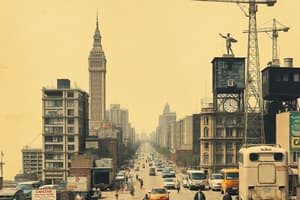Podcast
Questions and Answers
The Todaro migration model explains rural urban migration as an ______ rational process.
The Todaro migration model explains rural urban migration as an ______ rational process.
economically
The Harris-Todaro migration model is an ______ version of the Todaro migration model.
The Harris-Todaro migration model is an ______ version of the Todaro migration model.
equilibrium
According to the Todaro migration model, migrants calculate the ______ value of urban expected income.
According to the Todaro migration model, migrants calculate the ______ value of urban expected income.
present
The Harris-Todaro migration model predicts that expected ______ will be equated across rural and urban sectors.
The Harris-Todaro migration model predicts that expected ______ will be equated across rural and urban sectors.
The Todaro migration model focuses on the role of ______ incentives in the decision of workers to migrate.
The Todaro migration model focuses on the role of ______ incentives in the decision of workers to migrate.
One of the assumptions of the Todaro migration model is that there is visible ______ in the urban area but not in rural area.
One of the assumptions of the Todaro migration model is that there is visible ______ in the urban area but not in rural area.
Today’s poorest countries are far more ______ than today’s developed countries were when they were at a comparable level of development.
Today’s poorest countries are far more ______ than today’s developed countries were when they were at a comparable level of development.
Internal migration disproportionately increases the growth rate of urban ______ seekers relative to urban population growth.
Internal migration disproportionately increases the growth rate of urban ______ seekers relative to urban population growth.
The ______ rate increases whenever urban population growth exceeds rural population growth.
The ______ rate increases whenever urban population growth exceeds rural population growth.
The presence of well-educated young people in the migrant system tends to ______ the urban labor supply.
The presence of well-educated young people in the migrant system tends to ______ the urban labor supply.
Urban job creation is generally more difficult and costly to accomplish than ______ job creation.
Urban job creation is generally more difficult and costly to accomplish than ______ job creation.
Rural-to-urban migration is occurring so rapidly in Asia that total rural population will fall by hundreds of millions of people by ______.
Rural-to-urban migration is occurring so rapidly in Asia that total rural population will fall by hundreds of millions of people by ______.
The notion that most governments in developing countries favor the ______ sector in their development policies, thereby creating a widening gap between the urban and rural economies.
The notion that most governments in developing countries favor the ______ sector in their development policies, thereby creating a widening gap between the urban and rural economies.
The pressures of rising urban wages and compulsory employee fringe benefits in combination with the unavailability of appropriate ______ production technologies lead to increases in labor productivity.
The pressures of rising urban wages and compulsory employee fringe benefits in combination with the unavailability of appropriate ______ production technologies lead to increases in labor productivity.
The movement of people from rural villages, towns, and farms to ______ centers (cities) in search of jobs.
The movement of people from rural villages, towns, and farms to ______ centers (cities) in search of jobs.
The rapid supply increase and lagging demand growth tend to convert a short-run problem of resource ______ into a long-run situation of chronic urban surplus labor.
The rapid supply increase and lagging demand growth tend to convert a short-run problem of resource ______ into a long-run situation of chronic urban surplus labor.
Colonial-era building codes in Nairobi, Kenya, made it impossible to build an “official” house for less than ______.
Colonial-era building codes in Nairobi, Kenya, made it impossible to build an “official” house for less than ______.
All economic policies have direct and indirect effects on the level and growth of urban or rural ______ or both.
All economic policies have direct and indirect effects on the level and growth of urban or rural ______ or both.
The law has also required every dwelling to be accessible by ______.
The law has also required every dwelling to be accessible by ______.
Economic policies will tend to influence the nature and magnitude of the ______ stream.
Economic policies will tend to influence the nature and magnitude of the ______ stream.
Migration worsens rural-urban structural ______ in two direct ways.
Migration worsens rural-urban structural ______ in two direct ways.
As a result, two-thirds of Nairobi’s land has been occupied by ______ of the population, while many slum dwellings cannot legally be improved.
As a result, two-thirds of Nairobi’s land has been occupied by ______ of the population, while many slum dwellings cannot legally be improved.
At least 1 billion people (⅓ of the urban population) live in urban ______ settlements in all developing countries.
At least 1 billion people (⅓ of the urban population) live in urban ______ settlements in all developing countries.
There are slums because the government consciously makes the lives of new migrants miserable to deter them from migrating to ______.
There are slums because the government consciously makes the lives of new migrants miserable to deter them from migrating to ______.
In Manila, Philippines, a large majority of the population has historically been too poor to be able to buy or rent an officially “legal” ______.
In Manila, Philippines, a large majority of the population has historically been too poor to be able to buy or rent an officially “legal” ______.
A critical issue that needs to be addressed is the extent to which national governments can formulate ______ policies that can have a definite impact on trends in and the character of urban growth.
A critical issue that needs to be addressed is the extent to which national governments can formulate ______ policies that can have a definite impact on trends in and the character of urban growth.
The level of ______ in the Philippines reached 51.2 percent.
The level of ______ in the Philippines reached 51.2 percent.
There were 7,437 barangays classified as ______ and 34,599 as rural.
There were 7,437 barangays classified as ______ and 34,599 as rural.
Five regions surpass the national level of ______.
Five regions surpass the national level of ______.
The emphasis on industrial ______, technological sophistication, and metropolitan growth created a substantial geographic imbalance in economic opportunities.
The emphasis on industrial ______, technological sophistication, and metropolitan growth created a substantial geographic imbalance in economic opportunities.
The City of Davao registers the biggest ______ population among the HUCs outside the NCR
The City of Davao registers the biggest ______ population among the HUCs outside the NCR
Region IV-A - CALABARZON has the highest level of ______ with 70.5%
Region IV-A - CALABARZON has the highest level of ______ with 70.5%
Agglomeration economies refer to ______ advantages to producers and consumers from the location in cities and towns
Agglomeration economies refer to ______ advantages to producers and consumers from the location in cities and towns
The Bangsamoro Autonomous Region in Muslim Mindanao or BARMM has a ______ level of urbanization of 27.6%
The Bangsamoro Autonomous Region in Muslim Mindanao or BARMM has a ______ level of urbanization of 27.6%
The City of Cebu has an ______ population of 908,195 and a level of urbanization of 94.2 percent
The City of Cebu has an ______ population of 908,195 and a level of urbanization of 94.2 percent
Cities are formed because they provide ______ advantages to producers and consumers
Cities are formed because they provide ______ advantages to producers and consumers
Region VIII - Eastern Visayas has a ______ level of urbanization of 14.7%
Region VIII - Eastern Visayas has a ______ level of urbanization of 14.7%
Urbanization economies and localization economies are two forms of ______ economies
Urbanization economies and localization economies are two forms of ______ economies
Flashcards are hidden until you start studying
Study Notes
Migration and Urbanization
- Migration worsens rural-urban structural imbalances in two direct ways:
- Supply side: internal migration increases urban job seekers relative to urban population growth, depleting rural areas of valuable human capital
- Demand side: urban job creation is more difficult and costly than rural job creation, leading to chronic urban surplus labor
- The Harris-Todaro migration model explains rural-urban migration as an economically rational process despite high urban unemployment and underemployment
- Migrants calculate the present value of urban expected income and move if it exceeds average rural income
Urbanization Trends
- Urbanization rate increases when urban population growth exceeds rural population growth
- Rural-to-urban migration is occurring rapidly in Asia, with total rural population expected to fall by hundreds of millions by 2050
- Urbanization is not solely driven by income; other factors are at play
Urban Bias and Rural-Urban Migration
- Urban bias refers to governments favoring the urban sector in development policies, widening the gap between urban and rural economies
- Rural-urban migration is responsible for the explosion of urban shantytowns, partly due to misguided urban-planning policies and outmoded building codes
Urban Slums and Government Policies
- At least 1 billion people live in urban slum settlements in developing countries
- Governments often create conditions that make it difficult for new migrants to settle in cities, leading to the proliferation of slums
- Examples: Nairobi, Kenya, and Manila, Philippines, where colonial-era building codes and restrictive laws have contributed to the growth of slums
Level of Urbanization in the Philippines
- In 2015, the level of urbanization in the Philippines was 51.2%, with 51.73 million people residing in urban areas
- Five regions surpassed the national level of urbanization: Region IV-A - CALABARZON, Region XI - Davao, Region III - Central Luzon, Region XII - SOCCSKSARGEN, and the National Capital Region (NCR)
Urban Population in the Philippines
- The City of Davao registers the biggest urban population among the Highly Urbanized Cities (HUCs) outside the NCR, with 1.63 million urban residents
- Other HUCs with significant urban populations include the City of Cebu and the City of Zamboanga
Studying That Suits You
Use AI to generate personalized quizzes and flashcards to suit your learning preferences.



